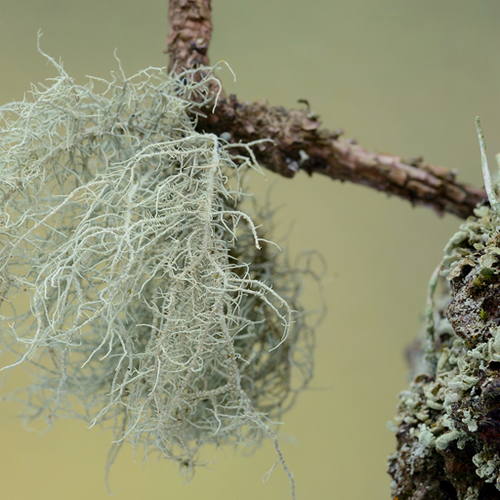
Usnea
Scientific names: Usnea barbata, Usnea filipendula, Usnea florida, Usnea ghattensis, Usnea hirta, Usnea longissimi, Usnea plicata, Usnea scabrata
Family: Usneaceae
Alternate names: Acide Usnique, Barba de Capuchino, Barbe de Jupiter, Barbe de Saint Antoine, Beard Moss, Mousse d'Arbre, Musgo de los Arboles, Old Man's Beard, Sodium Usniate, Tree Moss, Tree's Dandruff, Usnea Lichen, Usnée, Usnée Barbue, Usnée Fleurie, Usniate de Sodium, Usnic Acid, Woman's Long Hair
Actions: Analgesic/antipyretic activity, Antibacterial and antimicrobial activity, Anticancer activity, Anti-inflammatory activity, Antioxidant activity, Antiparasitic activity, Antiplatelet and antithrombotic activities, Antiproliferative activity, Antitermite activity, Antiviral activity, Cytochrome P450, Gastroprotective, Weight loss, Wound healing activity
Background
Usnea (Usnea barbata) is a lichen that grows on trees. Lichens appear to be a single plant, but they are really fungus and algae that grow together.
Usnea contains chemicals that are thought to fight germs that might cause infections. These chemicals might also decrease swelling, pain, and fever.
People use usnea for cough, obesity, pain, wound healing, and many other purposes, but there is no good scientific evidence to support these uses.
Don't confuse usnea with another lichen called oak moss. These are not the same.
Usnea contains chemicals that are thought to fight germs that might cause infections. These chemicals might also decrease swelling, pain, and fever.
People use usnea for cough, obesity, pain, wound healing, and many other purposes, but there is no good scientific evidence to support these uses.
Don't confuse usnea with another lichen called oak moss. These are not the same.
Safety Safety definitions
When taken by mouth: Usnea is possibly unsafe. Usnea contains a chemical called usnic acid (sodium usniate) that might cause liver damage.
When applied to the skin: Usnea is possibly safe. But it might cause allergic reactions, including skin rash, in some people.
Liver disease: Usnea contains some chemicals that might harm the liver. If you have liver disease, don't take usnea by mouth.
When applied to the skin: Usnea is possibly safe. But it might cause allergic reactions, including skin rash, in some people.
Special Precautions & Warnings:
Pregnancy and breast-feeding: There isn't enough reliable information to know if usnea is safe to use when pregnant or breast-feeding. Stay on the safe side and avoid use.Liver disease: Usnea contains some chemicals that might harm the liver. If you have liver disease, don't take usnea by mouth.
Effectiveness
Effective Effectiveness definitions
There is interest in using usnea for a number of purposes, but there isn't enough reliable information to say whether it might be helpful.
Dosing & administration
There isn't enough reliable information to know what an appropriate dose of usnea might be. Keep in mind that natural products are not always necessarily safe and dosages can be important. Be sure to follow relevant directions on product labels and consult a healthcare professional before using.
Interactions with pharmaceuticals
It is not known if Usnea interacts with any medicines. Before taking Usnea, talk with your healthcare professional if you take any medications.
Interactions with herbs & supplements
There are no known interactions with herbs and supplements.
Interactions with foods
There are no known interactions with foods.
vital.ly has licensed monographs from TRC Healthcare.
This monograph was last reviewed on 17/06/2024 10:00:00 and last updated on 26/09/2022 03:10:35. Monographs are reviewed and/or updated multiple times per month and at least once per year.
Natural Medicines disclaims any responsibility related to medical consequences of using any medical product. Effort is made to ensure that the information contained in this monograph is accurate at the time it was published. Consumers and medical professionals who consult this monograph are cautioned that any medical or product related decision is the sole responsibility of the consumer and/or the health care professional. A legal License Agreement sets limitations on downloading, storing, or printing content from this Database. No reproduction of this monograph or any content from this Database is permitted without written permission from the publisher. It is unlawful to download, store, or distribute content from this site.




